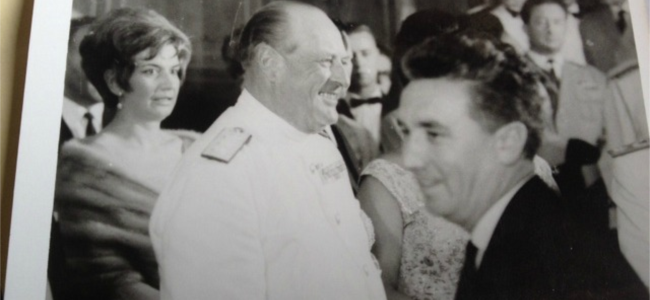Some friendships are built to last forever. When carefully tended, they bloom and grow in beauty. If friendships were flowers, Ms Katarina Kotlic would have a whole flower garden.
During 38 years with the Norwegian embassy in Belgrade, she planted many such flowers deepening relations between Norway and then Yugoslavia, but had also made many Norwegian friends. One of them is in Belgrade at the moment, visiting her.
It all began in 1953, when Katarina started doing administrative work at the Norwegian Embassy in Belgrade. It was only three of them sitting in a two-room apartment in the main pedestrian street in Belgrade – Knez Mihailova. “We were like a family. I spent more time with them than with my own family,” says Katarina.
As she was watching the family grow, she was also watching the Yugoslav-Norwegian relations develop and broaden. A special relationship between Yugoslavia and Norway was formed after the Second World War, based on relations developed between returning Yugoslav Prisoners of War in German concentration camps in Norway and civilian Norwegians trying to help them.
This was the backbone of the Embassy activities in the aftermath of the Second World War. The Embassy was trying to further deepen these connections by serving as a hub for gathering all the PoWs. According to Katarina, friendship was always in the air. “There was a group of people who got connected through the Embassy and something like an unofficial club of Serbian-Norwegian friendship was formed,” she adds.
One of the reasons for such a strong friendship might lay in fact that Norwegians and Serbs are similar in a way, Katarina notes. “They are easy going, simple, honest, they love our food, especially prsuta, ajvar and rakija,” says Katarina.
Katarina did not perceive her work as a job as it intercepted with her private life. Throughout the years, she made many Norwegian friends. After work, they would spend time together and with Katarina’s friends, coming to her slava etc. She truly enjoyed working at the Embassy and was doing everything from her heart. “If there had been something to be done, to keep after children or anything, I would have been there.”
In addition to this, her little surprises are still well-known in Embassy-related circles be it a surprise party for the ambassador’s wife with a cancan band, or April’s fools.
She admits that she would sometimes go along easier with Norwegians than with Yugoslavs. “We had a family relationship; when Norwegians accept you, that is for the entire life,” she stresses.
For her work, Katarina was decorated twice. She changed seven ambassadors and four office spaces until her retirement in 1991.
Many great memories make it hard for her to single out one. However, probably one of the most important events for her and Yugoslav-Norway relations was the visit of King Olav V of Norway in 1966. She still remembers the big reception organised in hotel Metropol in Belgrade hosted by the late Yugoslav president Josip Broz Tito. “It was very special, women in long dresses were wearing hats and gloves.”
But, when it comes to bad memories, she cannot think of any. “Preparing the 17th of May [Norwegian Constitution Day celebration] was something really frustrating because of all the different and big lists for reception at the residence,” Katarina recalls.
Being retired for 25 years now, Katarina considers herself lucky to have had such great job and so many friends from Norway she keeps in touch with. She is also proud that Norway is one of the biggest bilateral donors to Serbia. “They proved to be true friends when they were one of the first to help during the floods in 2014 and and now with the refugees,” she concludes.






